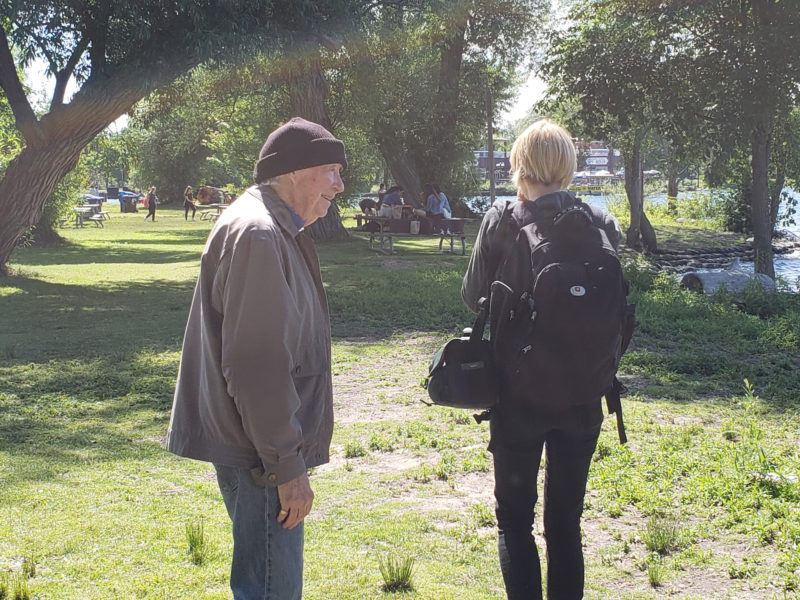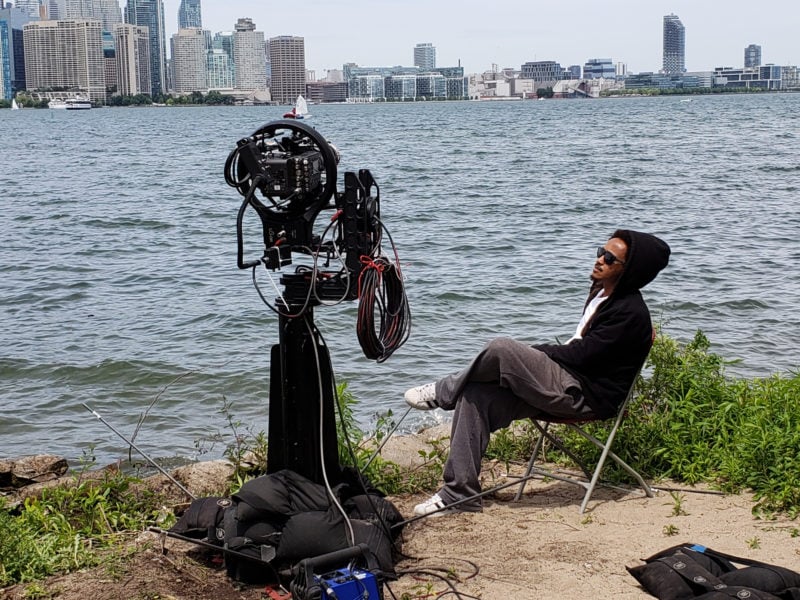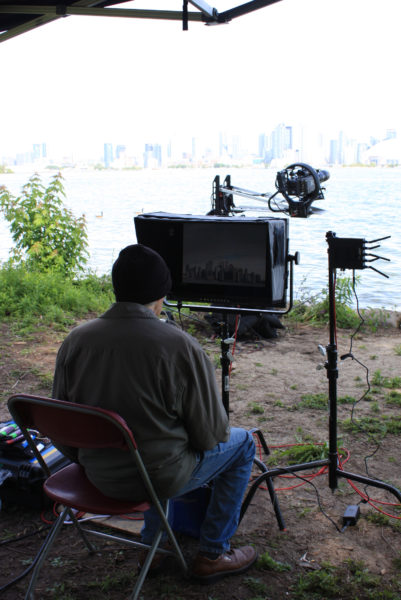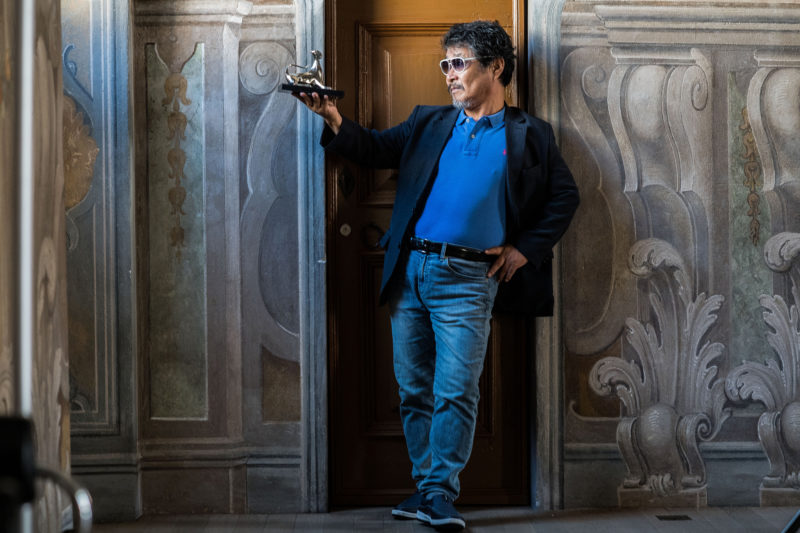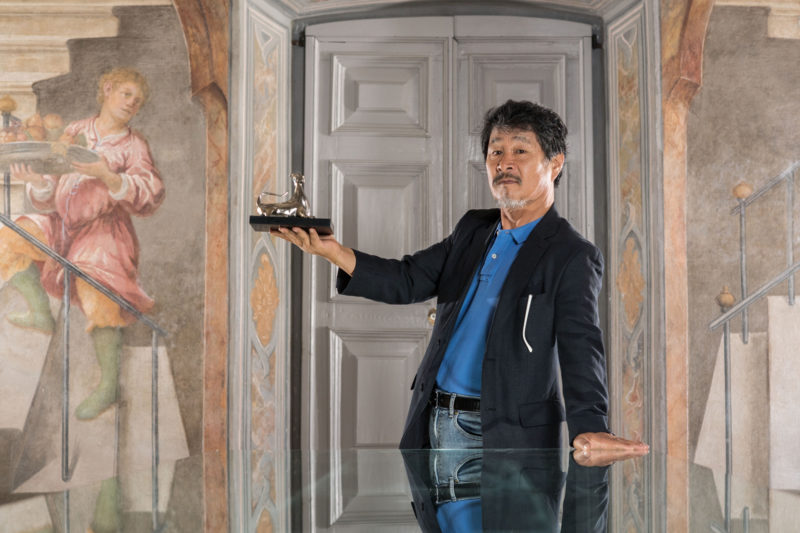Michael Snow and Aimée Mitchell For more than 50 years, Canadian filmmaker Michael Snow has almost single-handedly redefined how cinema can move with such vision-bending masterworks as Wavelength (1967), La Région Centrale (1971), and *Corpus Callosum (2002). Now Snow has just finished production on his latest film, Cityscape, which was shot in IMAX from Toronto’s Centre Island and will be edited in the coming months. It is set to debut in September 2019 as part of the XL Outer Worlds festival, screening at Toronto’s Cinesphere. The XL Outer Worlds website describes Cityscape as an “elaboration” on the methods used in the making of Snow’s three-hour opus La Région Centrale, in which a 360-degree-rotating-camera device, invented by Snow, captured the dimensions of a barren and rocky landscape with galactic dynamism. However, when speaking to Film Comment, Snow explained that his thinking about the relationship between the two films has changed. “La Région Centrale used planetary cyclic motion as a model,” Snow told Film Comment. “There is a unique inter-relationship between the means used to make the film and its cosmic subject. After much deliberation, I found that no aspect of the methods used in LRC should be used in another, distantly related work. So, my forthcoming IMAX film has different sources than LRC.” Specifically, Snow said that “rather than the circular movements of LRC, Cityscape’s movements will be angular,” and that the latter work will be “small” (about five to 10 minutes—consistent with Snow’s elastic bounds for his films, which can run from four minutes to 45 to 270).
Daniel Negatu Curated by Janine Marchessault and the grandson of IMAX inventor Roman Kroitor, Christian Kroitor, XL Outer Worlds has commissioned four other Canadian filmmakers—Kelly Richardson, Leila Sujir, Lisa Jackson, and Oliver Husain—to make short films in IMAX, to celebrate 50 years of the format. “It’s sad to me that, as a medium, artists are not more involved [with IMAX],” Marchessault said. “It always seems beyond the scope of what artists can afford, or the tech is not accessible.” She is excited for both the recent interest in expanded cinema and the diversity of forms of movies made in IMAX, beyond Hollywood blockbusters. After Toronto, the festival will tour across Canada’s original IMAX theaters in Montreal, Sudbury, Edmonton, and Victoria. Plans are being made for screenings in China and the United States, including Washington’s National Air and Space Museum, Seattle’s Pacific Science Center, New Orleans’s Audubon Nature Institute, and Los Angeles’s California Science Center. “I am very much looking forward to what IMAX’s high-speed will feel like,” Snow said.
Photo Credits: Courtesy of Janine Marchessault, Aimée Mitchell, and Jessica Mulvogue.
Films on the Horizon
Photo by Sean DiSerio. Rebecca Hall is set to make her directorial debut with an adaptation of Nella Larsen’s 1929 film Passing, in which Clare, a mixed-race woman from Harlem, passes as white for Jack, her white husband . . . Last month Paul Verhoeven started shooting Blessed Virgin in Italy. It’s the story of a convent during the plague in the 15th century, and the aftereffects when a nun who can performe miracles joins the group . . . In June, Clint Eastwood began principal photography on The Mule, a true-story crime drama. Eastwood directs and stars as the titular Leo Sharp, alias “La Tata,” a World War II veteran and florist who began smuggling cocaine for the Sinaloa Cartel in the 1980s.
Readings
La Main du Diable (Photo courtesy of Austrian Film Museum) ✸ The Academy of Motion Picture Arts and Sciences announced a new category, “Outstanding Achievement in Popular Film,” in addition to Best Picture. The move recalls the very first Academy Awards in 1929, in which two films were awarded a “Best Film” prize, “Outstanding Picture” (William Wellman’s Wings) and “Best Unique or Artistic Picture” (F.W. Murnau’s Sunrise: A Song of Two Humans). ✸ Christoph Huber and Patrick Holzapfel discuss Maurice and Jacques Tourneur, subject of a rare father-son retrospective at Vienna’s Filmmuseum. ✸ The Locarno Festival announced the prizes for its 71st edition, awarding the Golden Leopard to Yeo Siew Hua’s A Land Imagined, the Leopard for Best Direction to Dominga Sotomayor for Too Late to Die Young, and Best Film in Signs of Life to Lin Zi’s The Fragile House. The award for Best Actor went to Ki Joobong, for Hong Sangsoo’s latest, Hotel by the River, and the resulting photo shoot is worthy of note.
